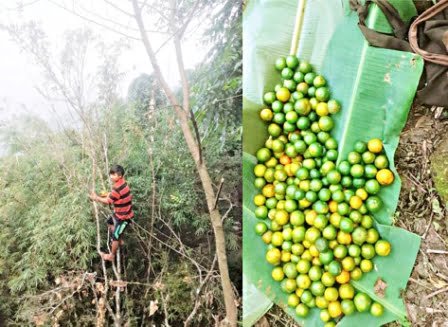The Khasi mandarin, prized by locals as the juiciest and unmatched citrus fruit, which used to grow in abundance in the South West Khasi Hills village of Nongnah, could soon disappear altogether, fear farmers of the fruit.
Lastborn Pariong, one of the top mandarin growers from Nongnah, told Highland Post that over the years, production of the fruit has dropped drastically due to a number of reasons.
Pariong has seen a decline in the harvest on his three hectare orchard over the past 20 years.
One of the major causes of the collapse in production has been down to attacks by a stink bug known as niang ksem or niang bajung in the local language.
The fruit tends to make an appearance in the trees in September when temperatures begin to dip but by August the trees are heavily infested with the bugs, which cause the new shoots, fruit and flowers to wilt and drop prematurely.
The government machinery has been less than helpful in tackling this problem, which began to make an appearance from 1979 onwards, Pariong said, when large areas were deforested to supply the demand for timber.
“I’m not sad or dismayed but very angry because all the efforts we made to meet the officers of concerned government departments to help us with this problem went in vain and ended just in talks,” he said. “The samples of the soil and the pests have been given to the concerned office in Mawkyrwat to test but there was no response or result.”
He added that even the mandarin saplings distributed by the Horticulture Department arrive at the wrong time – between August and December – when they should be planted in June or July.
Nongnah and its 106 households, that are mandarin growers, once used to fill up to 50 trucks every season with the fruits, this has now dropped to as little as four per year.
“This year we don’t even have mandarins to consume ourselves and I think the mandarin of Nongrah will just become a long gone story if this persists and if the government continues to ignore and turn a blind eye towards us,” he said.
Most of the mandarins from the village head to areas on the Bangladesh border, like Ranikor and Nolikata where they can earn a profit of up to Rs 20 per mandarin in December. Meanwhile, a large chunk of the profits from the fruit that end up in Shillong are taken by traders in Ïewduh, he said.






























